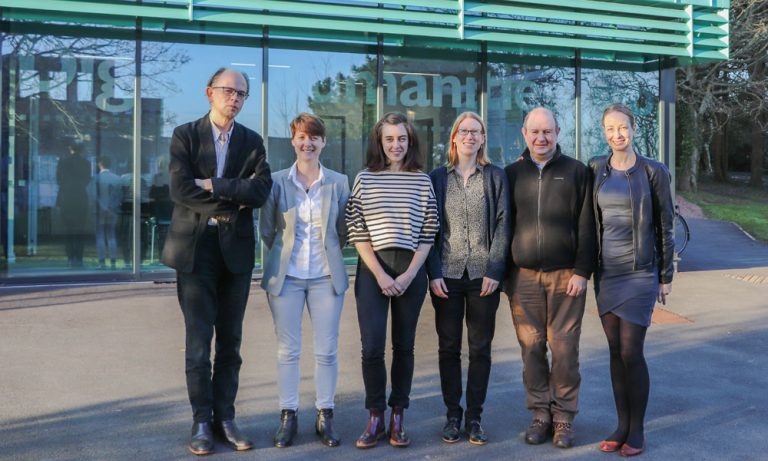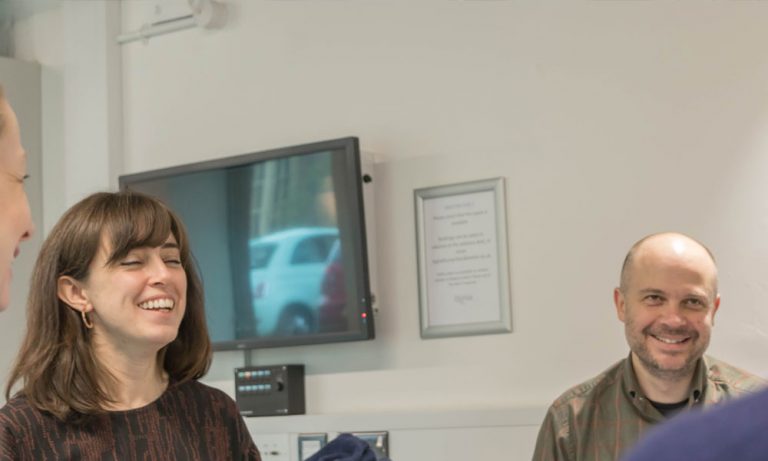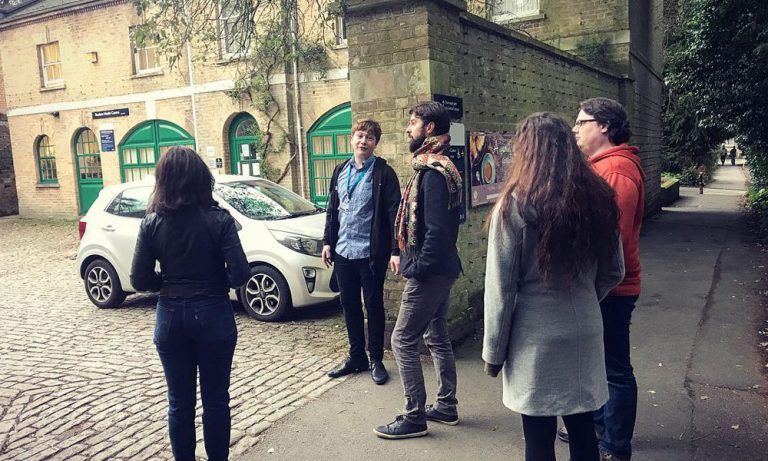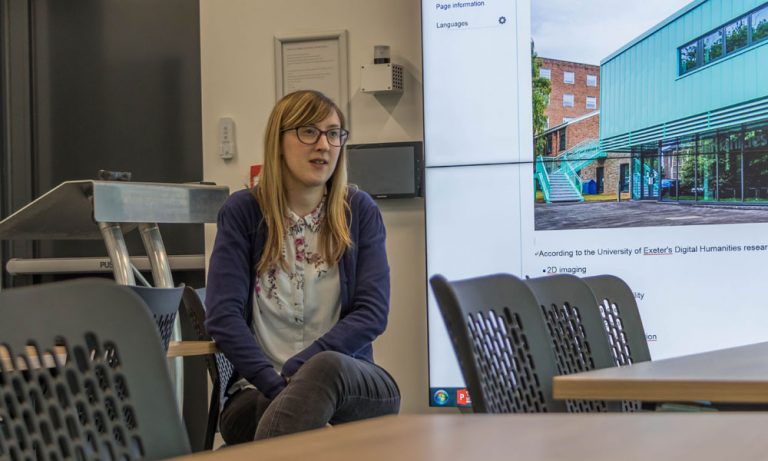
L-R: Professor James Clark (Exeter), Dr. Charlotte Tupman (Exeter), Dr. Emily Murphy (UBCO), Dr. Lizzie Williamson (Exeter), Gary Stringer (Exeter), and Dr. Karis Shearer (UBCO).
What do mid-century sound recordings and medieval manuscripts have in common? Thanks to a new Digital Humanities (DH) collaboration between the University of Exeter and the University of British Columbia Okanagan (UBCO), students now have new resources to learn to digitize both.
Digital pedagogy research has shown that one of the biggest challenges students face in DH is the lack of formal training in the tools and technologies required of them. We also know that resources are one of the biggest challenges to providing this training. Teams from both universities meet in Exeter for 10 days last week to share best practices for student training and research and to develop two online training modules, one for audio digitization, and another for text encoding.
“While online training alone isn’t the solution, delivering these skills through a hybrid model combining self-paced online modules with in-person training that brings participants into the lab communities is more closely aligned with the collaborative ethos that undergirds DH and is, I think, very promising,” says Dr. Karis Shearer, Associate Professor of English and Director of the AMP Lab.
UBCO team members from the AMP Lab and the Centre for Culture and Technology in the Faculty of Creative and Critical Studies (FCCS) visited the Exeter Digital Humanities Lab in the College of Humanities. The labs at the two universities apply the methods, tools, and critical approaches of the Digital Humanities in teaching and research. The new modules they have created will be implemented in classrooms, as independent self-paced learning, and as research training.
The collaboration builds on the foundations laid this spring, when Professor Bryce Traister, Dean of FCCS, made a visit to the University of Exeter. This June provided an opportunity to deepen the partnership at the Digital Editions, Digital Archives symposium organised by Karis Shearer and Dr Francisco Pena, Associate Professor of Spanish. From Exeter, Professor James Clark, Associate Dean for Research and Impact for Exeter’s College of Humanities, and Dr Charlotte Tupman, Research Fellow in Digital Humanities, attended to discuss their research and opportunities for collaboration.
The two visits established that the complementary expertise of our institutions will enable knowledge exchange in several key areas of digital expertise, including text encoding, audio digitisation, 3D printing, and 2D digital photography.
Digital Humanities research and training is key in both universities, notes Traister: “Exeter University has one of the top humanities faculties in the UK, in no small part because it has united the best of traditional humanities scholarship with visionary investment in cutting-edge and newer forms of humanities research. Exeter is a natural partner for the Faculty of Creative and Critical Studies at UBC’s Okanagan campus.”
Student training in digital humanities is at the heart of this initiative, with student interns actively involved in the production of the modules themselves. At UBCO, student intern Stephen French (BA English candidate and SpokenWeb RA), brings strong technical skills, as well as interests in literary audio and podcast production. With Shearer and Dr. Miles Thorogood, he will contribute to the reel-to-reel and compact-cassette digitisation content creation. At Exeter, student intern Connor Spence (in the second year of his undergraduate studies in English) will contribute his encoding skills and his experience as a DH Lab intern to this initiative. With Tupman, he will assist in the creation and testing of the collaborative training module for encoding languages to digitize text.
These modules will be implemented immediately in student training. Dr. Emily Murphy, Assistant Professor of Digital Humanities, will use the text encoding module in her courses next year, and audio digitization module will support the research training for the AMP Lab and SpokenWeb SSHRC Partnership.
“UBC’s Faculty of Creative and Critical Studies is thrilled to be collaborating with the University of Exeter on digital humanities training,” says Greg Garrard, Associate Dean of Research in FCCS. “It will help support our new Digital Arts and Humanities graduate degree, and at the same time also provide exciting research opportunities for students.”
To continue the collaboration, the teams at the two universities are looking for new ways to support student training and professional development.
“We anticipate that this collaborative pilot project will lead to the development of a wider programme of online, self-paced training provision in digital skills for Exeter and UBCO students, and a longer-term collaboration between Exeter and UBCO in Digital Humanities.” Says Tupman
“This is an exciting development for digital humanities at Exeter, just a year after our new Lab facilities were opened,” says Professor James Clark. “As might be expected from connective technology, digitally-enabled Humanities is a truly international research community, characterised by creative exchanges right across global Higher Education. Our project with UBC Okanagan is an excellent opportunity to enhance and extend our own practice in partnership with a centre of excellence at one of the world’s leading universities.”

Photo credit: Stephen French
Emily Murphy (AMP Lab Assistant Director and Professor of Digital Humanities) and Leif Isaksen (Professor of Digital Humanities).

Photo credit: Karis Shearer The UBCO team get a tour of the city of Exeter.

Photo credit: Stephen French (UBCO undergraduate intern). DH Lab Manager Emma Sherriff facilitates a session on Wikipedia editing.